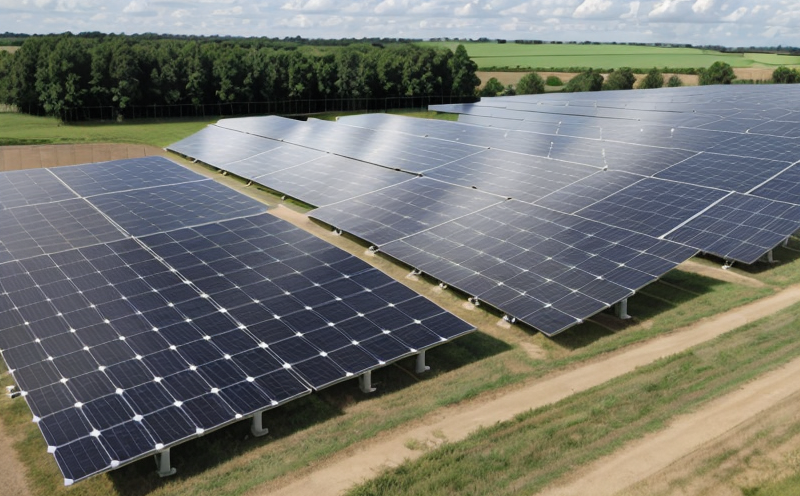IEEE 1547.1 Compliance Testing of Renewable Interconnection Systems
The IEEE Standard IEEE Std 1547-2018, “Standard for Interconnecting Distributed Resources with Electric Power Systems,” is a critical standard that addresses the safe and efficient interconnection of renewable energy systems into distribution-level power networks. This compliance testing ensures that these systems meet all technical requirements, including voltage, frequency, and fault ride-through performance.
Our service focuses specifically on IEEE Std 1547.1, which is the extension to IEEE Standard 1547-2018 that provides additional guidance for testing renewable interconnection systems (RIS). This standard ensures compliance with key parameters such as power quality, harmonic distortion, and stability under various fault conditions.
Our laboratory adheres strictly to these standards to ensure accurate and reliable testing results. The service involves a comprehensive process from initial specimen preparation through final certification. Our team of experts uses state-of-the-art equipment and follows strict protocols to ensure that all tests are conducted in accordance with international best practices.
The results of this testing are essential for ensuring the safe operation of renewable energy systems, which is critical as these systems become an increasingly important part of the power grid. We provide detailed reports that not only meet regulatory requirements but also offer valuable insights into system performance under various conditions.
Scope and Methodology
| Test Parameter | Description |
|---|---|
| Voltage Fluctuations | Testing for voltage excursions within the specified range to ensure safe operation. |
| Frequency Variations | Evaluation of system response during frequency fluctuations to prevent instability. |
| Harmonic Distortion | Measurement and analysis of harmonic content in the output to meet quality standards. |
| Fault Ride-Through Capability | Determination of how well the system can withstand faults without tripping or causing damage. |
| Power Quality Indicators | Assessment of voltage, current, and power factor under normal and fault conditions. |
| Communication Protocols | Verification that all communication between the interconnection system and the grid is secure and reliable. |
The testing process involves careful preparation of specimens to simulate real-world operating conditions. This includes setting up controlled environments that mimic various fault scenarios, voltage fluctuations, and frequency variations. Our laboratory uses high-precision instruments to measure these parameters with precision and accuracy.
Once the tests are completed, we provide detailed reports that document all findings, along with recommendations for any necessary adjustments or improvements. These reports serve not only as compliance documentation but also as valuable tools for ongoing system optimization and performance enhancement.
Why Choose This Test
- Regulatory Compliance: Ensures that your renewable interconnection systems meet all applicable regulatory requirements, avoiding fines or penalties.
- Enhanced Safety: Identifies potential hazards early in the development process, reducing risks to personnel and equipment.
- Better Performance: Provides insights into system behavior under various conditions, leading to improved efficiency and reliability.
- Market Readiness: Demonstrates that your systems meet current industry standards, making them more attractive to buyers and investors.
The IEEE 1547.1 compliance testing is a vital step in the development of renewable energy systems. By ensuring compliance with these rigorous standards, we help you create products that are safe, reliable, and efficient—a crucial factor as the world increasingly turns towards renewable resources.
Competitive Advantage and Market Impact
- Innovation: By staying ahead of regulatory changes and testing to the highest standards, you can differentiate yourself in the market.
- Consumer Trust: Compliance with these stringent standards builds trust among consumers, who are increasingly interested in green technologies.
- Cost Efficiency: Early identification of issues through comprehensive testing can save significant costs by avoiding costly redesigns later on.
- Growth Opportunities: Demonstrating compliance opens doors to new markets and partnerships, enhancing your overall market position.
The IEEE 1547.1 compliance test is not just a requirement; it's an opportunity to demonstrate leadership in the renewable energy sector. By ensuring that your systems meet these rigorous standards, you can gain a competitive edge and contribute positively to the global shift towards cleaner energy sources.





